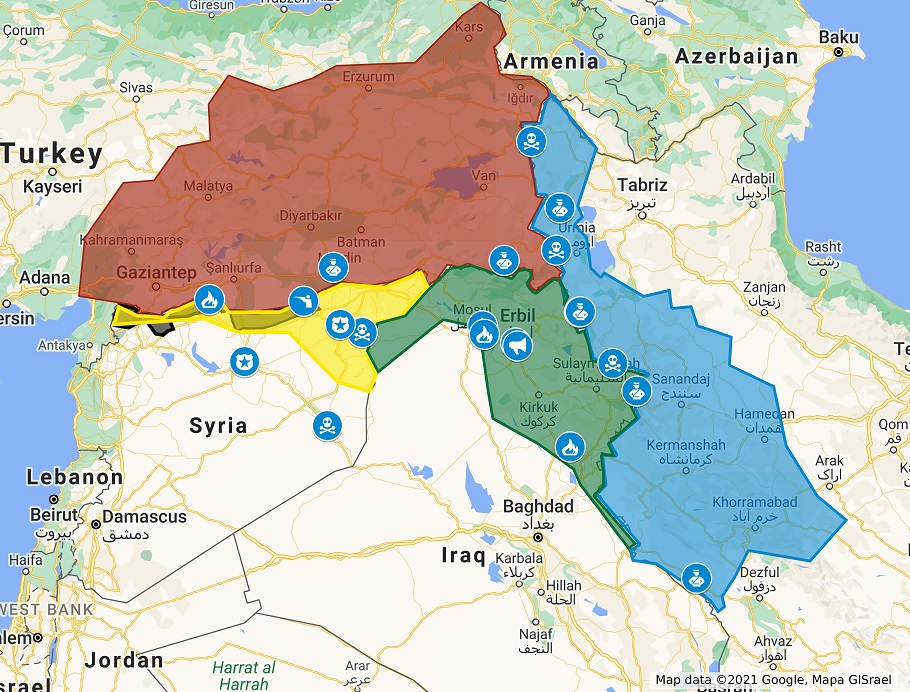1.7K
A weekly brief of events that occurred in the Kurdish regions of Iran, Iraq, Syria, and Turkey.
Iran
- The Democratic Party of Iranian Kurdistan (KDP-I) claimed responsibility for the assassination of an Islamic Revolutionary Guard Corps commander (IRGC) named Osman Hossini near Piranshahr. The KDP-I also claimed Hossini was responsible for the death of a KDP-I Peshmerga and has clashed with the IRGC several times since it resumed its campaigns of armed struggle and civil resistance against the Iranian regime in March 2016.
- Iranian and Turkish border guards killed three Kurdish border porters (Kolbars) last week. The Hengaw Organization for Human Rights reported a Kolbar named Hassan Kachalanu, who was one of two Kolbars arrested by Turkish authorities near Chaldaron, was tortured to death. The other Kolbar reportedly escaped and arrived at a local hospital with severe injuries. That said, Turkish forces killed a Kolbar named Burhan Solimani near Urmia’s Qatur District. Concurrently, Iranian border guards killed a Kolbar named Hiwa Qaderi near Bahan. Iranian border guards also severely wounded a Kolbar named Haji Mena Ali near Sardasht and another named Zahir Khaderzada near Baneh.
- Iranian security forces arrested a Kurdish man named Abdul Sattar Karimi in Dehloran’s Zarenawa District after he was accused of membership in a Kurdish opposition party. Furthermore, Iranian security forces and intelligence officers (Ettela’at) arrested at least six Kurds last week, including Gulala Muradi and her two sons, 14-year-old Matin Bazazi and 21-year-old Tahir Bazazi, in Piranshahr, two siblings in Salmas named Eraj Alizadeh and Gulam Alizahed, and another named Jalil Qadiri in Baneh. Iranian authorities also detained five Kurds in Marivan for several hours on unknown charges but eventually released them.
Iraq
- The Iranian-backed militia known as Saraya Awlia ad Dam (Guardians of Blood Companies) attacked Erbil International Airport with explosive-laden drones in an attempt to strike the US base located in the airport complex on Wednesday night. Iranian-backed militants previously targeted the airport with rockets in February, and Wednesday’s attack, like the previous one, was met with denouncement from European and American officials. Meanwhile, a rocket attack on a Turkish base in Nineveh Governorate’s Bashiqa District killed a Turkish soldier on Wednesday. Another rocket attack targeted an Iranian-backed militia post near Bartila on Friday. Though some Iranian-backed militants accused the Peshmerga of being behind Friday’s attack, the Peshmerga denied responsibility. Lastly, a Katuysha rocket landed in Diyala Governorate’s Kifri District on Monday, injuring a civilian and causing property damage. Though it is unclear who was behind Monday’s attack, ISIS (Da’esh) and Iranian-backed militias remain the likely suspects, as both have become increasingly active in Iraq’s “Disputed Territories” since October 2017.
- The President of Kurdistan Region Nechirvan Barzani appealed to United Nations Secretary-General António Guterres for an increased UN role in mediating disputes between the Kurdistan Regional Government (KRG) and Government of Iraq (GOI) regarding various outstanding issues, including anti-Kurdish policies in the “Disputed Territories,” Article 140 of the Constitution of Iraq, and revenue sharing. That said, Iraq’s Ministry of Finance finalized the Kurdistan Region’s share of the federal budget, which is based on the region’s share of Iraq’s population (12-13 percent) and is approximately eleven trillion, five hundred million Iraqi Dinar. The KRG responded to the Ministry of Finance’s decision by reaffirming its commitment to share revenues from oil sales and customs duties with the GOI.
Syria
- The Turkish-backed Sultan Murad Brigade and Hamza Division engaged in internal fighting over revenues from taxation, extortion, and other criminal rackets in the Kurdish town of Sari Kani last week. The Sultan Murad Brigade has previously clashed with the Hamza Division and al Sharqiya Division over illicit revenues, and infighting and criminality have become the norm in Turkish-occupied areas of northeastern Syria despite Turkey’s efforts to halt conflicts between its proxies.
- Turkey and its proxies continued to launch indirect fire attacks on the Syrian Democratic Forces (SDF)-occupied rural areas surrounding Ain Essa last week. At the same time, a Turkish drone struck a house that once served as imprisoned Kurdish leader Abdullah Ocalan’s residence in Kobani’s Ailblor village. Ocalan resided in the house during the 1990s, and it remained a symbolic site for the village’s residents.
- Suspected Da’esh terrorists assassinated an Iraqi refugee with a silenced pistol and injured two women in al Hawl camp last week. The attack comes in spite of a two-week SDF operation in the camp that resulted in the arrest of numerous Da’esh operatives and sympathizers. Concurrently, the Kurdish-led Autonomous Administration of North and East of Syria (AANES) repatriated 34 children of deceased or imprisoned Russian Da’esh terrorists to the Russian government and continued calls for the world’s nations to retrieve their citizens from the camp, which continues to hold thousands of foreign relatives of Da’esh operatives.
- The SDF announced the arrest of dozens of Da’esh terrorists in al Hasakah, al Raqqa, and Deir Ez Zor during US-backed raids last week and claimed the detained terrorists were planning to attack AANES offices and civilians in al Hasakah. That said, Da’esh launched additional attacks throughout the region, including the killing of a civilian in Deir Ez Zor Governorate’s ad Diban town, and maintains control of parts of Syria’s Badia region despite Russian airstrikes and support for the Assad regime.
Turkey
- A Turkish court in Aydin sentenced 16 members of the local Kurdish Democratic Regions Party (DBP) to three years and six weeks in prison for participation in anti-government protests in 2014. Furthermore, Turkish police arrested at least ten people, mostly members of the pro-Peoples’ Democratic Party (HDP), in Mardin, Çukurca, Hakkâri, and Batman. Simultaneously, additional parliamentary immunity cases were filed with the Grand National Assembly of Turkey against numerous HDP lawmakers and ten legislators from the Republican People’s Party (CHP), mostly for “insulting the President” or criticizing him via social media or public remarks.

